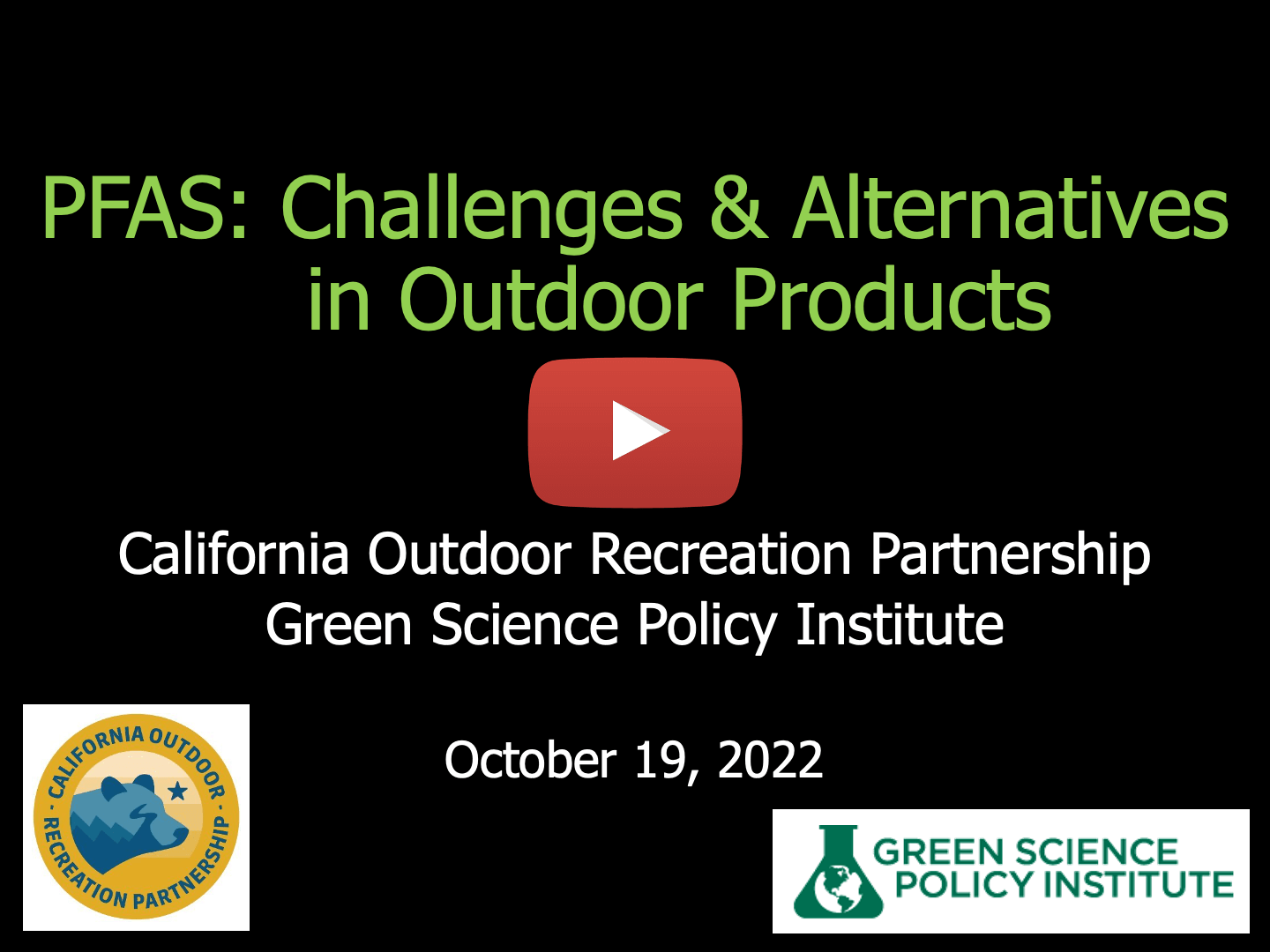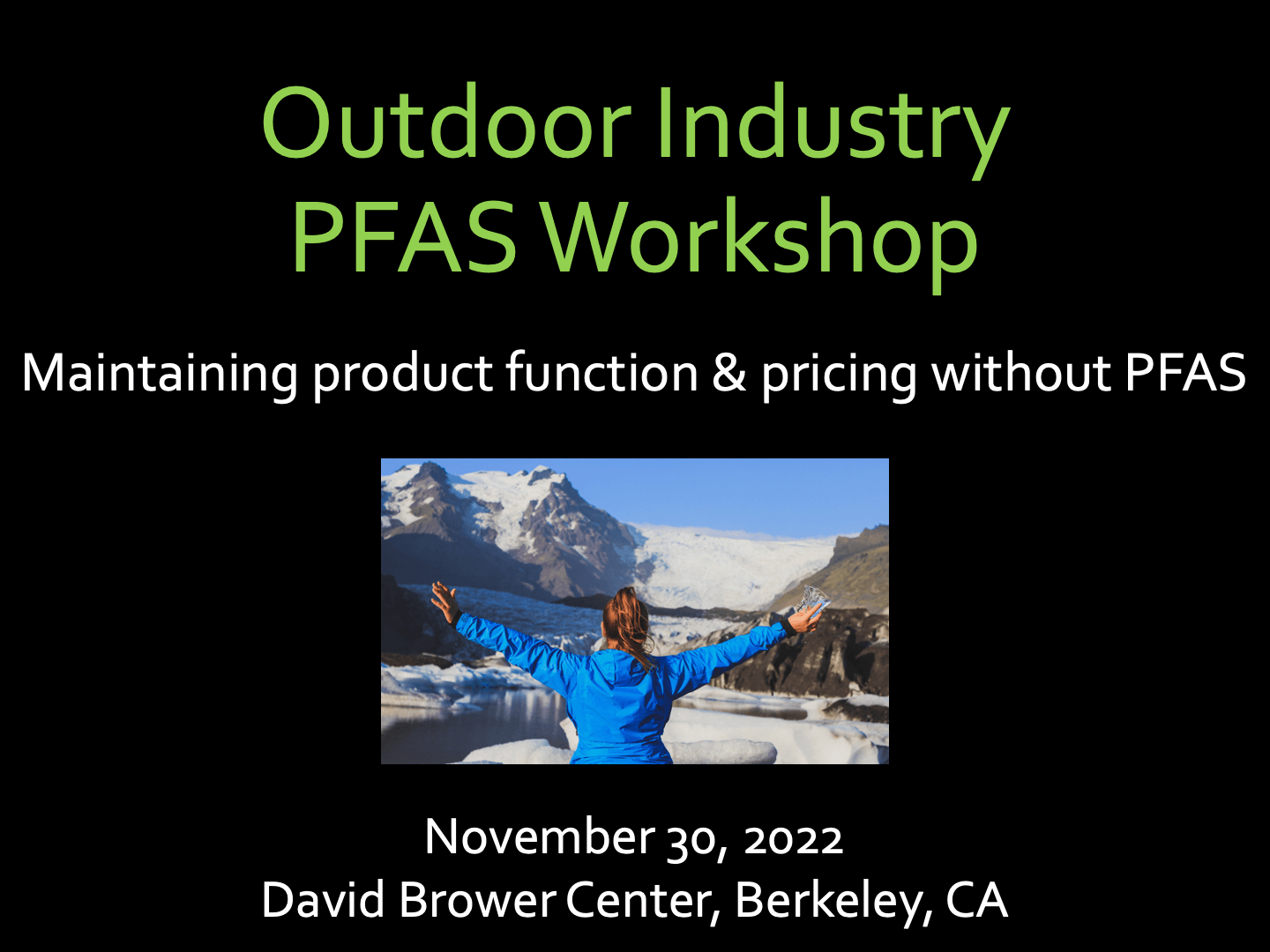PFAS in Outdoor Gear
California and New York laws ban the use of PFAS in most textiles by 2025. Here are resources to help the outdoor industry produce better products without PFAS.
Due to their extreme persistence and potential for health and environmental harm, the PFAS in stain- and water-resistant textiles are being phased out. View a webinar here co-hosted by the California Outdoor Recreation Partnership and the Green Science Policy Institute to help you stop the use of PFAS in your outdoor products. Speakers include outdoor leaders, innovators, and the author of the California legislation.
Check out slides on the basics of PFAS, the current regulatory landscape, and a path forward towards reducing their use while maintaining quality products. These talks were presented during a recent participatory meeting with a dozen outdoor retailers including Columbia, Nike, and Patagonia, as well as others along the supply chain, scientists, innovators of safer alternatives, and government & NGO representatives.
Recent Textiles Legislation
- California: Assembly Bill 621 prohibits PFAS in juvenile products beginning July 1, 2023. Exemptions include electronics, medical devices, and internal components of juvenile products.
- New York: Senate Bill S6291A originally prohibited PFAS in apparel beginning December 31, 2023 - but this was updated to begin January 1, 2025. Professional uniforms and outerwear intended for extreme conditions are excluded.
- California: Assembly Bill 1817 prohibits PFAS in textiles beginning January 1, 2025. Exemptions exist for outerwear for extreme conditions not marketed to the public as well as textiles in transportation. Learn more here.
- Vermont: S.25 prohibits PFAS in textiles beginning January 1, 2026.
- Connecticut: Public Act 24-59 prohibits all PFAS in textiles and apparel on January 1, 2028, and restricts most uses beginning in 2026.
- Rhode Island: S 2152 prohibits PFAS in textiles beginning January 1, 2027, and prohibits apparel for severe wet conditions unless labeled as containing PFAS on January 1, 2029.
- Colorado: Senate Bill 24-081 prohibits PFAS in outdoor apparel for severe wet conditions unless labeled as containing PFAS on January 1, 2025, with a full restriction of such uses on January 1, 2028.
- Minnesota: HF 2310 broadly restricts all unavoidable PFAS uses by January 1, 2032.
- Maine: Public Law c. 477 originally required the reporting of all products containing PFAS beginning January 1, 2023, and prohibited products with PFAS from being sold in Maine effective January 1, 2030. This was amended by Public Law c. 630, with broader restrictions occuring in 2032. Learn more here.
Do you offer PFAS-free products?
Our webpage lists brands with PFAS-free products in outdoor gear, cosmetics, foodware, etc. Thousands of consumers looking for better products visit this page every month. To learn about being listed, view our eligibility criteria. Outdoor gear brands can find suppliers of PFAS-free DWRs and textiles such as Dimpora & Green Theme Technologies.
Need help phasing out PFAS in your products?
Certifying and Trade Organizations
Click the "plus" button to the left of each entry to learn more.
The AFIRM Group is a collaboration of the world's leading apparel and footwear brands working to reduce the use and impact of harmful substances in the apparel and footwear supply chains. Contact: AFIRM Director Nathaniel Sponsler.
AFIRM provides technical resources for managing chemicals in apparel, footwear, accessories, sporting goods, and product packaging. The 2023 AFIRM Restricted Substance List covers the entire class of PFAS and includes appropriate limits and test methods to ensure compliance with all existing and forthcoming global legislation. View AFIRM's PFAS Phaseout Guidance document here, which covers how to identify and phase out PFAS in products, including validation of compliance with various testing approaches.
Bluesign assesses bluesign system partner companies for their abilities to make chemistry (chemical suppliers), use chemistry (mills), and build products from better chemistry (brands) along with a thorough review of the chemicals, materials, and products.
Bluesign partners with chemical companies, manufacturers of materials, and brands to build a better supply network from the molecule forward. They have vetted dozens of companies making PFAS-free DWR products, ensuring effective chemistry in addition to evaluating if they are free from harmful substances — not just PFAS, but also a long list of other substances. See the resulting free list at finder.bluesign.com. Bluesign's system approach also includes working with material manufacturers to use better processes and chemistry to arrive at bluesign APPROVED materials which should be free of all unwanted substances, not just PFAS.
California Outdoor Recreation Partnership (CORP) is a membership organization of businesses & advocates in California's outdoor recreation industry.
CORP works to shape policy, support investments, and engage an inclusive community of outdoor participants in California around the benefits of outdoor recreation. Recently, CORP worked with CA Assemblymember Ting's Office, bill sponsor organizations, and outdoor gear brands to ensure effective legislation on PFAS in outdoor gear. For more information, contact CORP's director, Lexie Gritlefeld.
OEKO-TEX® works with 21,000 manufacturers, brands, and retailers in more than 100 countries to certify products to protect consumers, workers, and the planet. Certified products and suppliers can be found in their buying guide.
OEKO-TEX® has been setting high standards for textiles and leather for 30 years. Their standards stay ahead of global regulations and incorporate new scientific health data and production methods. The 2023 updates include a general ban on the use of per- and polyfluoroalkyl substances in textiles, leather, and footwear for STANDARD 100, LEATHER STANDARD, and ECO PASSPORT certifications, which are upheld through annual testing, control testing, and on-site audits.
The ZDHC Foundation is a global multi-stakeholder group that advances the adoption of sustainable chemistry in the textile, leather, & footwear industries. Learn more about ZDHC here and at their Academy platform.
ZDHC's Implementation HUB supports organizations by offering the solutions, training, and experts needed to put good chemical management in motion. ZDHC recognizes the risks posed by PFAS to human health and the environment and has added a restriction on all PFAS used for water and stain repellency treatments in its recent update to the ZDHC Manufacturing Restricted Substances List (MRSL). For a broad guide on chemicals in fashion, read their free e-book for all audiences, "Detoxing the Fashion Industry."
ZDHC is offering a free introductory course to all November 2022 workshop participants. Contact Lydia for more details.
Giving up PFAS could be a small, temporary step backward for some of your products, but a big step forward for the health of our population and planet.
– Matthias Foessel, Beyond Surface Technologies
Consultants & Legal Advice:
Amanda Cattermole, Cattermole Consulting Inc. can help identify where PFAS are used, eliminate their use, and communicate your plans with stakeholders. Learn more from her brochure.
Todd Copeland, Copeland Consultancy, LLC offers supply chain mapping, chemical policy implementation, and designs programs to reduce environmental and chemical impacts in products, materials, & supply chains.
Chris Enlow, Futurescapes Consulting, LLC develops corporate responsibility and ESG strategies to drive long-range planning into actions and results in the non-profit and for-profit sectors.
James Pollack, Marten Law LLP provides legal advice to help brands comply with the growing patchwork of PFAS regulations and effectively communicate sustainability efforts with consumers.
Krystle Moody Wood, Materevolve, LLC helps develop PFAS-free alternatives and products, coaches leaders on chemical best practices, and builds high-level executive strategies.
We climbed Mount Everest without PFAS. Do we need it to walk our dogs or go birdwatching?
– Arlene Blum, Green Science Policy Institute
Safer Alternatives
The ChemFORWARD SAFER™ program uses third-party toxicology firms, full disclosure (under NDA where necessary), and chemical hazard assessments to go beyond "free-of" claims and verify safer alternatives.
ChemFORWARD's SAFER program helps suppliers demonstrate human and environmental safety and build trust with their customers based on a rigorous, third-party process. Confidential business information is protected while providing greater transparency and making it easier for everyone to use assessment information throughout the supply chain. They use a new model of data-sharing that is cost-effective for individual suppliers while advancing collective impact through a shared repository of chemical hazard data and safer alternatives. Learn more here.
The GreenScreen Certified™ Standard for Textile Chemicals promotes safer chemical use in apparel and footwear.
SciveraLENS® uses a cloud-based program by Scivera with a 23 toxicological endpoint system that allows users to know what chemicals are in their products and identify safer alternatives when needed.
SciveraLENS® utilizes over 4,500 chemical hazard assessments completed by a team of experienced toxicologists, and helps organizations choose safer chemicals to create safer products. With SciveraLENS®, users access valuable chemical assessment information to help them make informed product development decisions, support their chemical and product certification needs, and build supply chain transparency by communicating chemical assessment information while protecting the proprietary ingredient information. Learn more here.
ToxFMD Screened Chemistry® by ToxServices is a certificate program focused on identifying the use of safer alternatives while eliminating hazardous chemicals in the textile industry.
ToxServices provides a streamlined assessment that screens textile treatment formulations (including textile auxiliaries, colorants, leather treatment chemicals, adhesives, and coatings) in textile, apparel, and footware production. The screening process includes confidential full formulation disclosure to ToxServices, chemical testing for adhearance to ZDHC's MRSL, and screening of ingredients through priority lists and other assessments to arrive at a Screened Chemistry score which determines whether the formulation is acceptable. Learn more here.
Resources
Green papers & more:
- KEEN Footwear's "The Road to PFAS Free Footwear"
- “Detoxing the Fashion Industry (for Dummies)” book
- A Review of PFAS as a Chemical Class in the Textile Sector
Peer-reviewed scientific literature:
- Scientific basis for managing PFAS as a chemical class
- The concept of essential use for determining when uses of PFASs can be phased out
- Optimizing Chemical Management in the United States & Canada through the Essential-Use approach
- Are Fluoropolymers Really of Low Concern for Human and Environmental Health and Separate from Other PFAS?
- Regulating PFAS as a Chemical Class under the California Safer Consumer Products Program
- ... and more, highlighted each week at PFASCentral.org/Science
Videos
PFAS in outdoor products webinar
Learn the basics about PFAS
PFAS as a class two minute video
Reducing harm from PFAS

